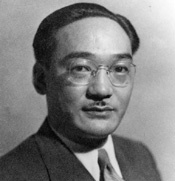It’s easy to lose sight of someone’s national reputation if that person is a part of the local fabric.
I'm reminded of this fact about the late Minoru Yasui, who died in 1986 after a long career as an attorney and community activist. In Denver, he’s best known as the executive director of the Denver Commission on Community Relations from 1967 to 1983. He’s often credited as the man who was so respected within Denver’s ethnic enclaves that he prevented the city from going up in flames of riot during the summer of 1967, when racial tensions ripped apart many other US cities. He’s remembered locally as a tireless fighter for civil rights and an energetic participant in numerous causes and no-profit organizations. He’s paid tribute every year through the Community Volunteer Awards given in his name to outstanding people who give their time as volunteers in the area.
But that’s his Denver area reputation. Nationally, and especially within the Japanese American community, he’s better-known as one of just three men who challenged the 1942 executive order that led to the imprisonment of 120,000 people of Japanese heritage in internment camps during World War II.
Maybe the story’s just not told often enough: Min Yasui grew up in Hood River, Oregon, the son of a very successful produce grower. The 1939 graduate of the University of Oregon Law School was well-known in the Portland area as the first JA attorney. When Pearl Harbor was bombed, he was working in Chicago for the Japanese consulate. His father advised Yasui to quit his job and join the Army, but immediately after the attack on Pearl Harbor, all Japanese Americans were declared enemy aliens and ineligible for US military service.
Upon his return to Portland, Yasui set out to challenge President Roosevelt’s Executive Order 9066. He flouted the curfew that kept anyone of Japanese descent off the streets after 8 pm, and walked up to a policemen at 11 pm on March 28, 1942 and demanded to be arrested. When he was rebuffed by the cop, who simply told him to go home, he marched into the local police station and was finally jailed.
He spent the next few months in a relocation center near Portland, then at the internment camp at Minidoka, Idaho. In November of 1942, the judge in his case agreed with Yasui and ruled that the curfew order was unconstitutional because it affected American citizens. But the judge also ruled that because Yasui had worked for the Japanese consulate, he had forfeited his American citizenship and was guilty of violating the curfew. An appeal was decided the next year by the US Supreme Court, which ruled that American citizens could be subjected to curfews, and but that Yasui had not forfeited his citizenship by working for the Japanese government.
Yasui’s sentence was reduced and he was released from solitary confinement in prison and sent back to Minidoka. His conviction for breaking curfew remained on the books until it was finally vacated in 1984. The famous cases that overturned his conviction along with the convictions of Fred Korematsu and Gordon Hirabayashi, the two other men who challenged Executive Order 9066, were instrumental in gaining the 1987 government apology and redress for Japanese Americans affected by internment.
Yasui moved to Denver in 1944, after a brief stay in Chicago where he worked odd jobs. He passed the Colorado bar exam with one of the highest scores that year but was denied a admission to the bar because of his criminal conviction. With the help of the ACLU, he was admitted to the Colorado bar in 1946, the same year he married True Shibata, who was from California but relocated to Denver after her release from the Amache Relocation Camp in Granada, Colorado. Along with his efforts in civil rights in Denver, Yasui was a powerful force behind the JA redress movement of the 1970s and ’80s.
Min died just three years after his name was finally cleared, but by then his stellar reputation in Denver had long been set. In 1976, he was honored with the establishment of the Minoru Yasui Community Volunteer Awards. In 1999 the city of Denver honored him again, by dedicating in his name the very building he worked in for years, as director of what is now called the city of Denver’s Agency for Human Rights and Community Relations.
During the recent ceremony marking the recipients of the 2002 Minoru Yasui Community Volunteer Awards, True Yasui accepted a poignant award on her late husband’s behalf. Dean Rennard Strickland and Professor Keith Aoki from the University of Oregon, Yasui’s alma mater, flew to Denver to give True Yasui a 2002 Meritorious Service Award, given each year to recipients who have made extraordinary contributions to legal education and the law. The school representatives also announced the University of Oregon also has established the Minoru Yasui Endowed Chair, which will bring noted attorneys working in human rights to the university as professors. Yasui was the first Japanese American graduate of the U of O in 1939; now his will be the first-ever Asian American name to grace an endowed chair for any law school in the country.
Min Yasui’s legacy is especially important in these time when civil rights is under attack from the government again, 60 years after Executive Order 9066.
Just this week, the media reported that hundreds of Iranian and other Middle East citizens in the Los Angeles area were jailed after coming forward to comply with a new rule that requires all males over 16 from a list of 20 Arab or Middle East countries, who do not have permanent resident status in the United States, to register with U.S. immigration authorities. This week was the deadline for men from Iran, Iraq, Syria, Libya and Sudan; authorities are refusing to give details of how many are imprisoned, although a news report quoted an activist saying that the jails are overflowing and people would be shipped to other states to accommodate the influx.
To any Japanese American, these reports bring a shudder of recognition, and the Japanese American Citizens League rightly announced its opposition to the policy as a blatant form of racial profiling. To any American, period, current events should ring alarm bells as a wake-up call to be more alert to injustices committed in the name of “security.”
Min Yasui would be outraged if he were alive today.
*This article was originally published in NIKKEI VIEW: The Asian American Blog on December 22, 2002.
© 2002 Gil Asakawa







